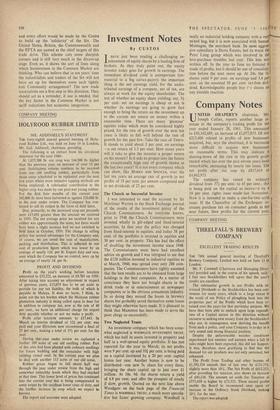Investment Notes
By CUSTOS
T HAVE just been reading a challenging re- assessment of equity shares by a leading firm of brokers. As they truly point out, the equity investor today goes for growth in earnings. The immediate dividend yield is unimportant (im- material to a big surtax-payer); the important thing is the net earnings yield, for the undis- tributed earnings of a company, net of tax, are always at work for the equity shareholder. The test of whether an equity share yielding, say, 31 per cent. net on earnings is cheap or not is whether its earnings are going to grow fast enough to bring the return on the investment up to the current net return on money within a reasonable time. There are many 'glamour' equities today which must be considered highly priced, for the rate of growth over the next ten years is likely to, fall well behind the rate of growth for the past few. Take the case of TESCO. It stands to yield about 3 per cent. on earnings —a net return of 1.3 per cent. How many years will it take to give the investor a proper return on his money? Is it safe to project into the future the exceptionally high rate of growth shown in the last two years? It is not every company which can show, like MARKS AND SPENCER, over the last ten years an average rate of growth in net profits of 18 per cent. per annum compound and in net dividends of 23 per cent.
The Church as Successful Investor I was interested to read the account by Sir Mortimer Warren in the Stock Exchange journal of the results of the investment policy of the Church Commissioners. As everyone knows, prior to 1948 the Church Commissioners were invested wholly in gilt-edged and fixed-interest securities. In that year the policy was changed from fixed-interest to equities, and today 38 per cent. of the portfolio is invested in equities and 30 per cent. in property. This has had the effect of doubling the investment income since 1948. The Commissioners must have had excellent advice on growth and I was intrigued to see that the £128 million invested in industrial equities as at March, 1960, was spread over only 288 com- panies. The Commissioners have rightly assumed that the best results are to be obtained from large holdings in the best companies. As a matter of conscience they have not bought shares in the drink trade or in entertainment or newspaper companies or in the obvious armaments industry. In so doing they missed the boom in brewery shares but probably saved themselves some losses they might otherwise have made. It is pleasant to think that Mammon has been made to serve the poor clergy so successfully.
Two Neglected Trusts An investment company which has been some- what neglected is WOODOATE INVESTMENT TRUST, which has half its assets invested in property and half in a well-spread equity portfolio. It has just reported for the year to March; its net profits were 9 per cent. up and 101- per cent. is being paid on a capital increased by a 20 per cent. capital bonus last year. Another bonus is now to be distributed—one new 5s. share for every three, bringing the share capital up to just over £1 million. At 10s. 9d. the shares return a yield of 4.8 per cent. and offer the prospect of steady if slow, growth. Quoted on the next line above Woodgate on the back page of the Financial Times is WOODHALL TRUST, a much more specula- tive but faster growing company. Woodhall is really an industrial holding company with a veil mixed bag, but it is now associated with Samuel Montague, the merchant bank. Its most aggres- sive subsidiary is Davis Estates, but its worst the Peter Long group which was involved in the hire-purchase troubles last year. This loss was written off. In the year to June no forecast is made of profits, but It should be one of consolida- tion before the next move up. At 24s. the 5s. shares yield 9 per cent. on earnings and 3.4 per cent. on the assumed 10 per cent. tax-free divi- dend. Knowledgeable people buy t'-c shares op any sizeable reaction.


































 Previous page
Previous page